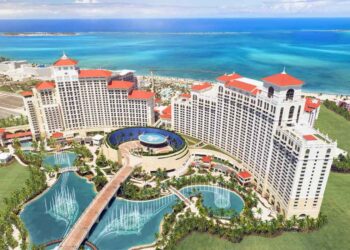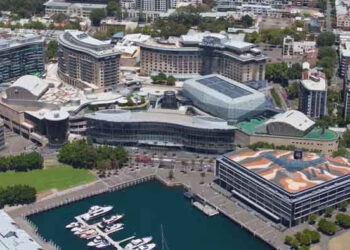Union Gaming Research Macau released the following note on 2nd July:
We estimate up to 4,000 incremental ETG seats within five years
We estimate that there are nearly 5,000 ETG seats in operation in Macau and Singapore, with likely another 2,000+ spread throughout other Asian gaming markets like Cambodia, South Korea, Philippines and Vietnam. In Macau, and in the context of the market-wide table cap, we have noticed most operators embarking on efficiency exercises that ultimately pull live-dealt traditional table games from the lower-end mass market and reallocate them to VIP or higher-yielding mass market segments. In turn, and in order to accommodate lower-end mass market play, these customers are being pushed towards ETGs as the best option to play at low stakes (e.g. <HK$200 per hand on baccarat). As a result, it is not uncommon to see mass market casino floors with table minimums of HK$500 and up during most day and week parts, while at the same time seeing new stadium-style ETG installations in a multi-game format (baccarat, roulette and Sic Bo). Stadium installations are in place at all of the mass-market focused SCL properties, as well as MPEL’s City of Dreams.
With an increased focus on table game yields and the likelihood of any new tables under the table cap scheme being exclusively allocated to new properties we think all Macau operators will continue to look at ETGs as the answer. Ultimately, we think the Macau ETG market could grow from over 3,500 seats today, to at least 5,500 within the next five years.
In Singapore, operators are constrained by the way the regulatory body classifies ETGs (see below) and as such, we do not anticipate significant changes to the ETG installed base over the near or medium terms. However, in other markets like Cambodia, ETGs appear to be in a strong growth phase, with a host of operators turning to ETGs for efficiency purposes and as they yield their existing live-dealt traditional table games. In addition to the 2,000 new ETG seats we expect in Macau, we would anticipate demand for another 1,500 to 2,000 ETG seats in other regional markets, driven by the four Manila Bay (Philippines) resorts coming online, as well as other new projects like Ho Tram in Vietnam and the second Naga casino in Phnom Penh. In summary, within the next five years we would expect incremental demand for at least another 3,500 to 4,000 ETG seats throughout Asia.
SHFL ETG revenue opportunity of USD36mm
Noted above, we estimate a total of 3,500 to 4,000 new ETGs throughout Asia over the next five years. Given the strong performance of SHFL’s Rapid series in markets like Singapore and Cambodia, along with a likely refresh of its stand-alone fully-automated product, we believe SHFL should capture at least a one-third share of the new ETG market (1,155 to 1,320 seats sold by SHFL). In addition, and assuming a favorable legal outcome in Macau, we believe that the company would likely gain an incremental 300 to 500 seats. Combined, we believe SHFL should place between 1,455 and 1,820 ETG seats through 2017. At a sales price of approximately USD20,000 per seat, the revenue opportunity for SHFL is USD29.1mm to 36.4mm. We estimate this will translate to an incremental USD16mm to USD20mm in EBITDA for Shuffle Master cumulatively over the expansion period.
ETG types: stadium and stand-alone; live dealer and fully-automated
There are two primary ETG installation types, stadium and stand-alone. A stadium installation typically consists of a large number of wagering terminals (seats) arranged in multiple banks and rows, with all terminals tied to a game or multiple games (any or all of baccarat, roulette or Sic Bo). Some stadium installations have up to 200 seats. A stand-alone game typically consists of five to ten seats configured in a semi-circle or circle that are all attached to a single game type.
We further note that many stadium installations also incorporate a live dealer or dealers depending on whether the installation is a single game type or multi-game. A live dealer installation would incorporate a live dealer along with a traditional baccarat, roulette or Sic Bo table, all of which are electronically tied to the wagering terminals. In some cases, a stadium terminal might be linked to many live-dealt tables to allow a customer to wager on several games (e.g. three roulette wheels) at the same time. Stand- alone games are typically fully-automated with no human input required for operation. Please see Figures 7 to 10 for photos of typical stand-alone and stadium game types.
The players
The installed base of ETGs in Macau and Singapore is dominated by six companies, who collectively have a market share in excess of 90%. These companies are:
· Aruze Gaming, a subsidiary of Universal Entertainment (6425 JP)
· Alfastreet, a privately held Slovenian gaming equipment manufacturer
· Elektroncek, under the Interblock brand name, a 50%-owned subsidiary of Aristocrat Leisure (ALL AX)
· Novomatic, under the Austrian Gaming Industries brand, a privately held Austrian gaming equip. manufacturer
· Paradise Entertainment (1180 HK), under the LT Game brand
· Shuffle Master (SHFL)
Classifying ETGs – in Macau it can be a slot or table, in Singapore it’s a slot
The regulatory schemes of Macau and Singapore allow for ETGs to be deployed on casino floors, although the classification schemes can vary depending on the level of human involvement. In Singapore, the CRA (regulatory body) considers ETGs to be part of the slot floor, regardless of human involvement (e.g. live dealer with electronic wagering), with each casino limited to no more than 2,500 electronic gaming positions. In Singapore, each ETG seat counts as one electronic gaming position. In Macau, a 100% automated ETG (no live dealer) would be recognized by the DICJ (regulatory body) as part of the slot floor with each ETG seat counting as one electronic gaming position. However, if an ETG in Macau requires human involvement (e.g. live dealer), as is the case with most of the stadium-style installations, these games are classified as table games and therefore are part of the total table allocation for each operator and subject to the market-wide table cap. These live dealer ETGs are classified at a very favorable ratio relative to a traditional baccarat table that has nine seats (a 9:1 seat to table ratio) as the DICJ applies a ratio of 50:1 or 60:1 for these ETGs. In this case, for a given dealer, the casino could accommodate 6x to 7x more customers per DICJ-allocated table game.
Performance
We believe that in both Macau and Singapore, ETGs, generally perform inline to above house slot win/day averages. In Singapore, an IR operator’s analysis is a bit clearer than in Macau given that all ETGs are classified as slot machines. As such, so long as an ETG seat performs at or above slot floor average (LVS reported USD665 in 1Q12), it essentially earns its keep. In Macau, however, with the hybrid approach by the DICJ, a casino operator in certain instances would compare ETG seat win/day against its traditional table games (win per mass market traditional table seat of USD792 in 1Q12), while in other instances comparing ETG win/day against its slot floor average (USD282 in 1Q12).
Macau
Manufacturers
The Macau ETG market is dominated by three manufacturers: Aruze, Interblock, and LT Game. Shuffle Master, which has a dominant position in Singapore, has largely been precluded from participating in the Macau market due to ongoing legal issues with LT Game. In the case of a favorable outcome for SHFL we believe the company is likely to take share as operators are generally inclined to give SHFL’s Rapid series of ETGs a chance based on the product’s success in markets like Cambodia (Naga) and Singapore (especially at Marina Bay Sands).
Game types
There appears to be a fairly even distribution of ETGs, by game type, relative to the typical Macau casino floor which is heavily dominated by baccarat. Multi-game machines constitute the largest share at nearly 1/3rd. These multi-game machines are typically found in stadium installations. No single ETG game type has a share greater than 25% (Sic Bo), with baccarat and roulette capturing 18% and 22%, respectively. Black Jack and Lucky Wheel installations barely register.
Casino operators
Generally, the operators with the greatest amount of mass market exposure also operate the largest numbers of ETGs. We note that Sands China also operates large stadium-style multi-game installations in each of its three mass market focused casinos, with Melco Crown’s City of Dreams recently adding a stadium installation of its own. Melco Crown, via its Mocha Clubs (slot parlor) segment operates a significant amount of stand-alone fully-automated ETGs.
Singapore
Manufacturers
Unlike Macau, where SHFL is litigating its ability to offer its popular Rapid series of ETG, the company is the dominant player with a nearly 50% share of the market (including a 73% share at Marina Bay Sands). The number two share belongs to Alfastreet, the privately held Slovenian gaming equipment manufacturer. The balance of manufacturers split the remaining 13%.
Game types
The installed base of ETGs in Singapore is dominated by stadium-style roulette games, with a 64% share. Baccarat and Sic Bo each have a share in the teens, while multi-game (two or three of the above games) only has a 9% share.
Casino operators
Each of the two Singapore IRs operates in excess of 600 ETG seats. We do not expect significant changes to the number of installed ETG seats as these games are calculated as part of each IRs statutory limit of 2,500 slots and each operator is at or near its allocated limit.






























